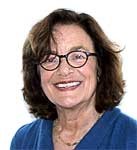“Remembering the Peace Corps — 60 Years Later” Marnie Mueller (Ecuador)
Remembering the Peace Corps — 60 Years Later
Marnie Elberson Mueller, Ecuador 1963-65
•
I was in my dormitory at Case Western Reserve University on March 1, 1961. I was a sophomore. I have this image of being in the downstairs parlor of a 19th Century building, looking toward the entryway, and for some reason thinking, “I want to do that,” meaning join the Peace Corps. I don’t know how I received the news. Was it from the radio or a newspaper or a letter from my parents? I’ll claim the latter because it’s the sort of information my parents would have loved: The adventure, the commitment to doing good, the concept of helping people to help themselves.
My father was an economist turned community organizer and my mother, a teacher with a commitment to underprivileged children. They married in 1938 and spent their honeymoon in a dirt-floored tent in the Farm Security Camp that was featured at the end of Grapes of Wrath. They remained there working with displaced dustbowl farmers for another year. In the spring of 1942, they reported to work at Tule Lake Japanese American high-security segregation camp, where my father put his degree in economics and his community organizing skills to the task of organizing a membership operated camp-wide consumer co-operative system, and my mother who was six months pregnant with me went to work teaching the children who were traumatized by being ripped from their homes to live behind barbed wire.
So the idea of activating self-help projects across race, nationality, and class was like second nature to me, having been inextricably ingrained in me from the moment I was born in the Tule Lake Camp. I waited to apply until I was in the last semester of my senior year and was immediately accepted for duty in Ecuador, beginning in the fall.
I showed up for training on November 22, 1963, at the Wellington Hotel in New York City. That afternoon Kennedy was assassinated. The next morning we were whisked away at dawn to Idlewild airport to fly to Puerto Rico for a month at Camp Crozier testing our endurance and self-esteem on Outward Bound challenges.
After three months of training in three different venues, we arrived in Quito, Ecuador. I was assigned to work as a community organizer in the coastal city of Guayaquil, in the barrio Cerro Santa Ana. I completed, what was a seminal, though at times troubling, experience in December of 1965. It has informed my view of the world for the past 50+ years. It has been my lodestone, for better or worse, in everything I do.
This film documentary best describes what I felt about my Peace Corps experience. It also shows my barrio. I’m the second volunteer in the movie, but the other two were in my group and also tell a part of my story.
The Not-So-Ugly Americans, 1965

Marnie, thanks for sharing. I have not seen the film yet but I am from WA state and know about the Japanese Internment camps on the West Coast. I also had a former boss that worked helping set-up, transfer and take-down the Farm Security Camps in the West during that period and he may have met your parents. I trained at Camp Radley with a group from Crozier that went to a different country so I am familiar with part of your experience. Again, thank you.
Dear Kim, Thank you for your thoughts and information. I’m curious what your former boss’s name was. Could you send it to me. All best, Marnie